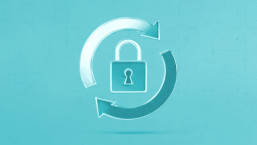Germans are known for many things: punctuality, directness, their focus on details and their love of beer. Now there is another attribute to add to this list – security-awareness. And, when it comes to shopping online, 91.6% of Germans try hard to stay protected from cyberthreats. Most of them (71.4 %) say they use antivirus or another traditional security solution, with every fifth e-shopper (20.2%) even opting for specialized software.
Compared with the three other countries surveyed by ESET – the US, Russia and the UK – only Brits come close to such impressive levels of protection. With regards to the British, if we add the 57.1% of respondents who use traditional cybersecurity approaches to the 32.2% who choose specialized solutions, we arrive at an almost-Germanic “desire to be protected” − 89.3%.
"One in three Russians go without security solutions when shopping online."
A stand-out in the polls are the Russians, with more than one in three online shoppers (33.9%) there using no protective measures whatsoever, and only 41.6% protecting their purchases with antivirus or a similar program. On the other hand, specialized solutions are more popular in Russia than in Germany, with almost one in four Russian e-shoppers using them (24.5%).
As tech-savvy as they might be, Germans are still very cautious when it comes to web shops. Their distrust means that almost two out of five German respondents (39.6%) say they never buy goods online.
The growing popularity of online shopping throughout the world
This is a remarkable contrast with the popularity that online shopping enjoys in the US and the UK. More than seven in 10 Brits (72.2%) regularly or at least sometimes purchase presents, clothing and other goods via the internet, making them the most “e-shoppy” nation in ESET’s survey, with Americans following closely on 68%. In Russia, the number of online shoppers is 64.7%.
Germans may well feel uneasy about shopping online, but, by adopting best practice techniques, including investing in security solutions that come with banking and payment protection and looking out for suspicious deals (especially nearer to big events like Black Friday), the experience can be seamless and safe.
Interestingly enough, polls have shown that e-shoppers in all four countries overwhelmingly choose well-known websites, such as Amazon, that give them an additional sense of security. In this category, Americans are the leaders (61.6%), followed by Brits (57.6%), Russians (57.2%) and Germans (50.6%).
What is also worth noting is that every fifth German (20.4%) would still buy goods from any website, despite the general distrust for e-shopping uncovered by the same ESET survey. This number differs significantly from the results in UK (7.3%), the US (6.1%) and Russia (13.1%).
The types of devices used when shopping online
Another interesting part of the survey is its focus on device preferences when shopping online. If you expect these to be dominated by smartphones and tablets, prepare to be surprised. Even Americans, often perceived as the most technically progressive, are sticking to their good-old laptops/notebooks (37.7%) and desktops (33.4%).
However, for those early adopters of technology, especially those using Android gadgets, it is important that mobile devices are kept secure when shopping online, as this will reduce any exposure to threats.
"More than one-third of Germans still rely on their desktops for online shopping."
It may not come as a surprise that by the same measure Germans are even more conservative, with more than one-third (35.5%) still relying on their desktops for online shopping. In Russia the most popular device for e-shopping remains a laptop or a notebook, with almost half of respondents (47.8%) there reaching for this kind of device.
The UK, however, is a lot keener on using tablets and mobiles when shopping online. Mobile, in fact, is second in choice (25.91) in terms of devices, behind laptops (34.12).
For a more detailed overview of the statistics highlighted in the infographic, please see below:
| How often do you shop online? | UK | US | DE | RUS |
|---|---|---|---|---|
| Never | 27.80% | 31.96% | 39.60% | 35.30% |
| Regularly or rarely | 72.21% | 68.04% | 60.40% | 64.70% |
| What protective measures are you using when shopping online? | UK | US | DE | RUS |
|---|---|---|---|---|
| Traditional security solution (e.g. Antivirus) | 57.06% | 66.01% | 71.40% | 41.60% |
| Specialist security for online payments | 32.21% | 20.51% | 20.20% | 24.50% |
| I don't use any protective measures | 10.74% | 13.48% | 8.40% | 33.90% |
| What statement best applies to your online shopping behavior? | UK | US | DE | RUS |
|---|---|---|---|---|
| I buy from well-known websites (e.g. Amazon) | 57.55% | 61.55% | 50.60% | 57.20% |
| I buy from any website | 7.26% | 6.14% | 20.40% | 13.10% |
| I buy from websites I personally trust | 35.19% | 32.31% | 29.00% | 29.70% |
| When shopping online, which device do you use most often? | UK | US | DE | RUS |
|---|---|---|---|---|
| Desktop | 22.43% | 33.44% | 35.50% | 20.60% |
| Laptop/Notebook | 34.12% | 37.71% | 28.20% | 47.80% |
| Tablet | 17.54% | 11.79% | 12.70% | 9.20% |
| Mobile | 25.91% | 17.06% | 23.50% | 22.40% |
| Protection by behavior | UK | ||
|---|---|---|---|
| Well-known websites | Any website | Trusted websites | |
| Traditional security solution (e.g. Antivirus) | 58,35% | 6,88% | 34,77% |
| Specialist security for online payments | 55,79% | 6,40% | 37,80% |
| I don't use any protective measures | 60,55% | 11,93% | 27,52% |
| US | |||
| Traditional security solution (e.g. Antivirus) | 62,70% | 4,82% | 32,48% |
| Specialist security for online payments | 61,19% | 4,57% | 34,25% |
| I don't use any protective measures | 54,17% | 16,67% | 29,17% |
| DE | |||
| Traditional security solution (e.g. Antivirus) | 51.40% | 19.33% | 29.27% |
| Specialist security for online payments | 47.52% | 22.77% | 29.70% |
| I don't use any protective measures | 51.19% | 23.81% | 25.00% |
Notes:
In the specific breakdown on how online shopping is being used and about habits, we address only percentages from the group of online shopping users.
The surveys were conducted during Q3 of 2015 on a demographically representative sample of at least 1,000 Internet users in each country. Surveys were conducted in the UK, US and Germany by Google Surveys, and in Russia by Merku.




